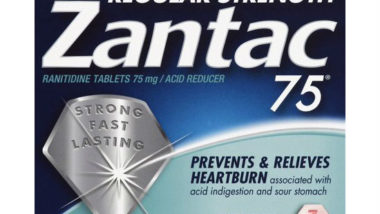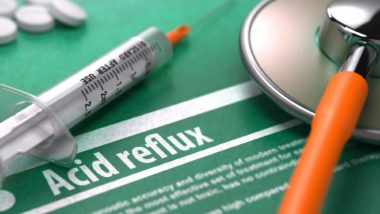Top Class Actions’s website and social media posts use affiliate links. If you make a purchase using such links, we may receive a commission, but it will not result in any additional charges to you. Please review our Affiliate Link Disclosure for more information.
A recent University of Buffalo study examining the side effects of heartburn medications has shown a connection between common acid reflux drugs and acute kidney failure. The research indicates that continued use of medications including omeprazole may be bad for your kidneys.
What is Omeprazole?
Omeprazole is the generic name of the acid reflux drug Prilosec. It is used for the treatment of ulcers and other issues caused by excessive stomach acid and relieves the symptoms associated with these conditions. Omeprazole is in a class of drugs known as proton pump inhibitors.
What are Proton Pump Inhibitors?
Proton pump inhibitors (PPIs) are medications that help to ease the symptoms of acid reflux. These medications work by blocking enzyme-producing acids and reducing the production of acid in the stomach. These drugs are available in both prescription and over the counter form. Omeprazole is sometimes used in combination with antibiotics to treat ulcers linked to an infection by the H. Pylori bacteria.
When the stomach over-produces acids, ulcers and sores may form in the esophagus, stomach, and duodenum. These problems can present themselves in the form of symptoms like heartburn, persistent coughing, and difficulty swallowing. Patients who reduce their stomach acid through the use of PPIs like Prilosec allow these sores time to heal. Other common PPI drugs are Nexium (esomeprazole) and Prevacid (lansoprazole).
In the United States, PPI drugs are some of the most commonly used medications. In fact, about 21 million Americans were prescribed PPI drugs in 2009. Now, about 10 percent of American adults take some kind of PPI medication.
Uses and Symptoms of Proton Pump Inhibitors
According to the Mayo Clinic, patients may take PPIs for a variety of conditions related to overactive stomach acids. These conditions may include stomach, esophageal, and duodenal sores and ulcers, gastroesophageal reflux disease (GERD), or Zollinger-Ellison syndrome. These medications may also be prescribed along with antibiotics for the treatment of Helicobacter pylori, an ulcer-causing bacteria.
Common side effects of proton pump inhibitors may include abdominal pain, fever, nausea, vomiting, rash, headache, and upset stomach. In addition to being bad for the kidneys, long term use of PPIs may increase also patients’ risk of developing a potentially dangerous infection known as Clostridium difficile. Long term PPI use may also increase the risk of osteoporosis-related bone injuries of the hip, wrist, and spine.
Happily, most research indicates that PPIs are fairly safe for use. A May 29, 2019 study published by Gastroenterology examined PPI links to other issues; researchers found that among 17,000 older adults using the drugs, there were no links discovered between their use of the drug and higher rates of conditions like cancer, fractures, type 2 diabetes, chronic kidney disease, chronic obstructive pulmonary disease, or dementia.
Another, larger study published on January 2, 2020, in the American Journal of Gastroenterology supported the earlier study’s observations. The 2020 study indicated that there was not an increased risk of dementia for those who use PPIs, which has been a concern in the past.
Experts have weighed in on why PPIs have attracted concern that they could be bad for your kidneys and may be linked to other health problems. According to Dr. Kyle Staller, a gastroenterologist at the Harvard-affiliated Massachusetts General Hospital speculated that “most people who take PPIs tend to be less healthy than those who don’t, and most studies are observational, meaning that they don’t prove that PPIs cause other conditions.” In sum, though there may be elevated cases of various elements among PPI users, they may be linked to other health issues, not linked to a patient’s use of the drugs.
He did note that PPI use lowers the amount of stomach acid present, and lowering the amount of stomach acid can open patients up to the risk of gastrointestinal infections. However, he stated that this risk was not sufficient to encourage patients to not use PPI medications.
What Does the Buffalo Study Show?
Researchers at the University of Buffalo reviewed the medical records of 190,000 patients who were prescribed PPI drugs for at least 12 months between July 1993 and September 2008. The patients included in the study did not have any evidence of preexisting kidney disease.
The researchers determined that the use of acid reflux drugs increased patients’ risk of kidney disease by 20 percent. Additionally, patients who took these drugs were four times more likely than people who did not take the drugs to experience kidney failure. Patients over the age of 65 were the most at-risk.
According to the study, between 40 to 55 percent of non-hospitalized patients taking PPIs may be taking these medications for no medical reason. Many patients with acid reflux only require short term treatment with these medications, but some people may be taking the drugs long term without reason. Long term use of these medications without medical need may be bad for your kidneys.

About 0.7 percent of those who took histamine-2 receptor antagonists were diagnosed with kidney disease, compared with about 5.6 percent of those who took PPI medications. The PPI study was published by Scientific Reports in February 2019.
Can I File an Omeprazole Lawsuit?
A growing number of people are coming forward with claims that PPI usage caused kidney damage and other serious side effects, including kidney failure. If you have been prescribed omeprazole or another proton pump inhibitor for the treatment of ulcers or acid reflux and suffered side effects like kidney damage, you may be eligible to hire an attorney and file a class action lawsuit in order to pursue compensation.
While a lawsuit cannot take away the pain and suffering caused by medication side effects, victims who have suffered kidney disease or damage due to omeprazole use may at least be able to recoup costs for injuries, medical expenses, loss of wages, or pain and suffering.
Filing a lawsuit can be a daunting prospect, especially in while dealing with health complications, so Top Class Actions has laid the groundwork for you by connecting you with an experienced attorney. Consulting an attorney can help you determine if you have a claim, navigate the complexities of litigation, and maximize your potential compensation.
If you or someone you know took PPI meds and suffered from Nexium stomach cancer or were hospitalized for Nexium kidney problems, you may qualify to file a Nexium lawsuit to pursue compensation for medical bills, pain and suffering, and more. See if you qualify for a Nexium lawsuit settlement by filling out the short form on this page. It’s absolutely free to participate, so act now!
ATTORNEY ADVERTISING
Top Class Actions is a Proud Member of the American Bar Association
LEGAL INFORMATION IS NOT LEGAL ADVICE
Top Class Actions Legal Statement
©2008 – 2024 Top Class Actions® LLC
Various Trademarks held by their respective owners
This website is not intended for viewing or usage by European Union citizens.
Get Help – It’s Free
Join a Free Prilosec, Nexium Lawsuit Investigation
If you qualify, an attorney will contact you to discuss the details of your potential case at no charge to you.
PLEASE NOTE: If you want to participate in this investigation, it is imperative that you reply to the law firm if they call or email you. Failing to do so may result in you not getting signed up as a client or getting you dropped as a client.
E-mail any problems with this form to:
Questions@TopClassActions.com.
Oops! We could not locate your form.













